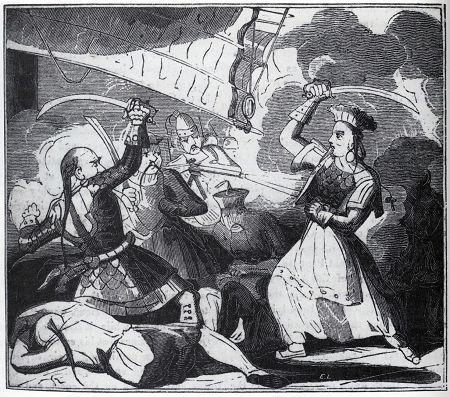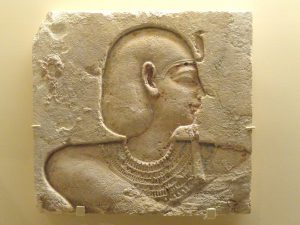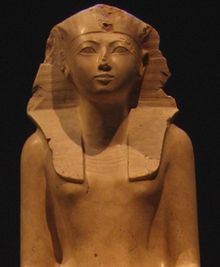Winner of the Spring 2019 StMU History Media Award for
The Article with the Best Introduction
The boiling clouds roll back, the tumultuous sky reduced to a slow simmer. A terrible maelstrom has just passed, wreaking havoc on this small fleet of ships. Shouting commands and curses, men in patchwork clothes run back and forth on the deck of a Chinese junk, hoisting its massive red sails to check for tears. Amidst the chaos, a crew member leans over the side, his eyes growing wide with shock and his words quivering at his lips. Crying out, he finally shouts the reason for his devastation.
Chuánzhǎng sǐle! The captain is dead!1
At this exclamation, the deck falls silent. The sails flap listlessly in the wind, accompanied only by the constant rainfall and the water that rocks the ship. Nobody says a word, the only break in the tableau being a crew member or two removing their hat in respect. Finally, from the cabin below the helm, a woman emerges into the gloom with a young man at her side. She has heard the news. Slowly, she makes her way across the ship to peer down into the sea below. Sure enough, she immediately spies her husband’s body floating like a piece of driftwood among the waves. However, instead of retreating to the cabin to mourn him, as was expected of a woman at that time, she turns to face the rest of the crew. A few high-ranking members have already convened to nominate a successor, but the woman waves her hand dismissively. There is no need for schemes, she says, for she will step up to fulfill the role. The young man beside her eagerly nods his head, immediately vouching for her. In stunned silence and with a perplexed curiosity, all eyes are on her. Who is this woman to assume command over an entire fleet of hardened pirates?2
Her official name was Cheng I Sao. Before that, however, she was Ching Shih.3
***
Ching Shih was born in 1775 to a poor family in Guangzhou, China, where she would grow up to work as a prostitute in a seedy brothel before her capture in 1801 by the infamous pirate captain Cheng I. He intended to exploit her in the same manner that he found her, but fell in love with her almost immediately upon bringing her back to his ship. From the moment she entered the scene, Shih exuded an aura of utmost poise and shrewd confidence. Only a few days after Shih nearly maimed the captain in a retaliatory assault, they were wed. Before the nuptials, though, Shih insisted she would only avow herself to him on one condition—that she would rule over his six fleets beside him. He agreed, and some time after, Shih bore him two sons. The couple later kidnapped and adopted an additional son named Chang Po Tsai during one of their many raids on small villages.4 For years, the family terrorized the southern coast of China—especially the area around the Pearl River Delta—until one fateful day in 1807. A typhoon unlike any other ravaged “the Red Flags,” their principal fleet. During the storm, Cheng I was swept overboard and later perished in the sea, leaving the crew without a captain. It was at this time that Shih stepped up to the plate and volunteered herself as leader, and, with her adopted son and lover vouching for her, it was generally agreed upon that he would become the commander of the Red Flags. Within a few years, Shih gathered around twelve hundred war junks and tens of thousands of buccaneers under her authority.5

During this period, the Emperor of China heard many reports from emissaries about the issue of piracy in the Middle Kingdom, including those of the dreaded Cheng I and his wife, the “Dragon Lady”; but, with so much on his agenda, he could barely spare any attention to these ragtag rapscallions aside from sending ships to investigate and engage in small skirmishes in harbors and up the river. Despite the Emperor’s lackadaisical attitude towards the situation, underestimating the Dragon Lady would soon prove a fatal mistake.6
Now a captain, Ching Shih proved herself an able leader through her management of finances and her establishment of a code of ethics. Aside from the standard fare of punishment for setting ashore without leave, it contained such unusual stipulations as forbidding the rape of female captives on pain of death, as well as requiring villagers to be paid compensation for certain supplies. Perhaps owing to her time spent in poverty as a prostitute, it seemed she held a tender spot in her heart for the most vulnerable among the population. Nevertheless, she refused to return to a life of destitution and was reported to have had no qualms about raiding as many villages as her fleets could manage, as well as ambushing imperial junks and charging protection for merchant ships hauling salt and opium. All passed relatively unnoticed, but when an important government official was killed in an attack, the Emperor finally took notice. He ordered the navy to track the “Dragon Lady” down to Macau, where a vicious standoff left the imperial forces defeated and the entire Pearl River up to Guangzhou available for the taking. Unfortunately, all this pillaging left her Red Flag fleet in desperate need of repairs and her funds in need of replenishing, so she retreated to the island of Lantau near Hong Kong to recuperate—the island where a great battle awaited her.7
***

It’s all quiet on the coastal front, a little too quiet. A northerly wind pushes onto the shore, the leaves in the trees rustling gently on the island of Lantau. Ching Shih sits at her desk, a portrait of sheer consternation, the wrinkles in her forehead having deepened over the course of the last few days. Reviewing her finances for what seems like the thousandth time, she sets the ink down and heads topside. It is only when she arrives on deck that she sees them. Imperial junks and Portuguese man o’ wars emerge from the morning mist like ghosts, all armed to the teeth and speedy to boot. Of course, she has been expecting a showdown like this for quite a while. She just wishes it had been a little later, as most of her flagship fleet is beached and out of use. Still, she shrugs and mutters a prayer to her deceased husband for protection and guidance. Now that she thinks about it, a shift in the breeze would do nicely at this point.8
Captain Ching Shih stares death in the face, as she has done many times in her life. This time, though, she does it with a smile. This time, she will win.9
***
Many days passed through fire and cannon shot in November of 1809, and the air turned black with smoke as volleys passed between the Chinese and foreign navies and Ching Shih’s meager forces. Only a few of her junks were in any sort of fighting shape, and they possessed next to nothing in capability compared to the juggernaut before them. To add salt to the wound, her most intimidating fighting power, the Black Flag fleet, had deserted Shih, even attacking the Red Flag fleet at some points. On top of that, the Red Flag fleet had been damaged in previous battles with the Chinese navy. In order to have at least a sliver of hope of victory, the remaining pirates cast flaming rafts in the water towards the enemy lines, aiming to gain the upper hand by burning their way to triumph, but the wind merely pushed them back towards Shih and her men. At last, when all hope seemed lost, a fortuitous change in the wind caused a flaming raft to smash straight into the midst of the blockade, sending a ship up in smoke. Gaining the upper hand, Shih and the pirates still loyal to her were finally able to get the most seaworthy junks on the waves to wage a great last stand, demolishing many of the enemy’s ships and pushing their way back into the Pearl River.10

The Emperor’s emissaries pressured her to surrender, but she continued to send her fleet to attack and raid around the Pearl River. However, after having balancing more conflicts with the Chinese government and the Black Flag fleet, Ching Shih realized that she must accept the offers of pardon. Although she agreed to surrender, being a woman of an immensely strategic disposition, she insisted that all terms be in her favor. Should the Emperor’s emissaries have balked and refused, she would simply resume her pillaging. After much negotiation and more than a fair amount of threats, legitimate and bluffed on both sides, the Chinese government was out of options and unable to refuse the famed Dragon Lady. They agreed to allow her and her crew to surrender with amnesty from the original executions they were sentenced to, in addition to all the wealth that Shih amassed since the day she married Cheng I in 1801. Retiring at the age of thirty-five, Shih inevitably returned to the brothel she wished she’d never see again—this time, however, as a very rich and successful manager, never to live in poverty again until she passed away at the age of sixty-nine.11
***
Resting by the water, an aging Ching Shih is reminded of the dauntless years of her youth. In small ripples on the surface, she sees distorted reflections of her beloved husband, the battles she fought, and the conquest of the waves which will forever be attributed to her name. No longer wielding a cutlass or beheading unruly subordinates, Shih has found peace at long last.12
- Pirates Through the Ages Reference Library, 2011, s.v. “Pirate Surrender Document.” ↵
- Pirates Through the Ages Reference Library, 2011, s.v. “Pirate Surrender Document.” ↵
- Pirates Through the Ages Reference Library, 2011, s.v. “Sao, Cheng I.” ↵
- Pirates Through the Ages Reference Library, 2011, s.v. “Sao, Cheng I.” ↵
- Pirates Through the Ages Reference Library, 2011, s.v. “Pirate Surrender Document.” ↵
- Alfred S. Bradford, Flying the Black Flag (Westport: Praeger Publishers, 2007), 144-148. ↵
- Cheng I Sao – Pirate Queen, video file, 10:50, YouTube, posted 2013, https://www.youtube.com/watch?v=-p2lhxUqMMQ. ↵
- Cheng I Sao – Pirate Queen, video file, 10:50, YouTube, posted 2013, https://www.youtube.com/watch?v=-p2lhxUqMMQ. ↵
- Cheng I Sao – Pirate Queen, video file, 10:50, YouTube, posted 2013, https://www.youtube.com/watch?v=-p2lhxUqMMQ. ↵
- Cheng I Sao – Pirate Queen, video file, 10:50, YouTube, posted 2013, https://www.youtube.com/watch?v=-p2lhxUqMMQ. ↵
- Ann Shen, Bad Girls Throughout History: 100 Remarkable Women Who Changed the World (San Francisco: Chronicle Books, 2016), 45. ↵
- Ann Shen, Bad Girls Throughout History: 100 Remarkable Women Who Changed the World (San Francisco: Chronicle Books, 2016), 45. ↵



67 comments
Andrea Degollado
Honestly clicking on this article I wasn’t sure what to expect, however I was not dissapointed. Ching was a very interesting person to read about, especially because I had never heard of her.. This article had very good choice of wording that really helped the reader be able to visualize what was going on. This article was very informative and helped me learn alot. Ching was a great women to read about and her leadership skills were admirable, I think its great reading about strong and powerful women because they provide a sense of admiration and satisfaction.
Sebastian Azcui
Very interesting article! The story of Ching Shih is very well written and developed by the author. At the beginning I had no idea what I was reading and what was the theme of the article. Ching Shih is one of the best pirated in history! She was able to lead many pirates around the sea and take control over all of them. It is inspiring to read that a woman was the captain and led all of them to success.
Amelia Hew
It’s amazing on how Ching Shih managed to change her fate and transformed herself from a lowly prostitute into a fearsome pirate captain. She has admirable leadership and a strong woman worthy of her title the Dragon Lady. Despite being cornered by the emperor’s army, she still stood her ground, refusing to surrender. Even though in the end she was forced to surrender, she even managed to negotiate with the Chinese Government and died a peaceful death at age sixty-nine. Her story as a ruthless pirate captain shall forever be remembered despite the many years that had passed since her death.
Shea Slusser
I wasn’t sure what to expect going into this article considering I have never heard of this event. I thought it was a good read and an interesting topic for the author of this article to write about. At first, I was a little skeptical that she actually was the one who killed her husband, but eventually through the reading of the article came to find out he was in fact swept into the sea. Interesting how the ending played out and how subtle the author talks about the kidnappings, but was a good read
Steven Clinton
Great article! Ching Shih story is very interesting. She was able to take command of a vessel of hardened pirates and lead them successfully. There aren’t many men with the moxy to step up and take control after the tragedy that occurred to the captain. Shih was a natural born leader and a overall confident woman. Her attitude and will is inspiring.
Roberto Rodriguez
I really did not know what I was expecting for this article when I first read the title. This was an awesome story that I am surprised is not straight out of Hollywood, it just seems to be so far-fetched and unreal. The article provided some truly great story telling, this article really deserves the title of best introduction, it got me engrossed in the world and it kept me wanting to read more. Ching Shih is truly a pirate legend that should be talked about more, she had humble beginnings, she was strong, assertive and an amazing leader. I cannot help but admire her for her leadership skills, especially when you consider the time period and how a woman was put in charge of all those men.
Maria Martinez
Ching Shih’s story is one that I had never heard before and i’m glad I have! There aren’t many stories told of women who have played such influential roles in history, and it is so interesting that she was able to gain the respect from men when women were not considered as capable as men, especially in battle. The fact that she was also able to negotiate so well to the point where she was able to live out her life as a wealthy woman was SO fascinating. Congratulations on the nomination!
Paola Arellano
Ching Shih What is another name that I had heard prior to reading this article. However, I think that the author made a great point to tell the story through her eyes. This also helped me as a reader understand more of the story and intrigue me in the manner. Shih, Without me realizing, played a great part in making women somehow equal to men. Although the stories from very long ago it still is something that we should carry in today society and living in a so-called man’s world.
Chelsea Alvarez
Congratulations on your nominations! Upon first glance, this story is not typically something I would read, but I am so glad that I did because I now hold knowledge on a topic that I knew nothing about. Ching Shih’s life was remarkable since she had a rough upbringing having to live through poverty, but being dedicated to working her way to success.
Victoria Salazar
Wow, great article. I really admire how despite being forced into prostitution, she carried herself with pride and confidence. I think that people are too often made to feel ashamed for things beyond their control. I also think it is admirable that her men actually respected her and listened to her commands. Although, I am sad that she returned to work as a manager at the brothel that made her life so miserable. I understand that sometimes people feel that they have no other choice, but I wish that she was able to live a better life than that.